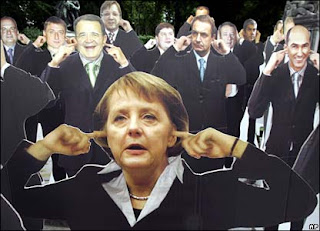Spending time with the grandchildren and reflecting on their inexhaustible level of innocence, grandpa thought maybe, just maybe the common denominator of "politician characteristics" was medically related. A couple of grandchild hugs later, grandpa thought maybe, just maybe these "characteristics" are due to a dietary deficiency. Think about it, the first lady planted an organic vegetable garden just over a year ago for the family's meals and formal dinners and there has been no evidence of confusion or irritability out of the White House since her inaugural harvest.
While grandma was out of town visiting a very dear friend, grandpa beckoned his crack research staff with a single mission of diagnosing the U.S. political malady and developing an antidote to assure all grandchildren of an equitable and optimistic future.
Grandpa's global crack research staff included Heineken's Political Behavioral Research (PBR) and Svedka's Associated Center for Disenchantment Control (ACDC) and they proved to be a most productive team. Bottom line, it is medical and the innately self centered, inept, self-absorbed, manipulative, devious and defective congress and congressional wannabe's traits do in fact stem from a dietary deficiency...Folate Deficiency.
Symptoms of Folate deficiency (credit WebMD and Nat'l Institute of Health) include Weakness, Confusion, Irritability, Lightheadedness, Forgetfulness and Difficulty Concentrating or Focusing Attention and Behavioral Disorders.
The proof is in the research results:
Chris Dodd: Assumed the role of the "financial reform" God as he believes this will be his legacy upon his departure from Washington D.C. after 36 years. Chris suffers from habitual Forgetfulness as despite his efforts for financial reform in 2010, he voted to repeal Glass-Steagall in 1999.
Richard Blumenthal (Connecticut Attorney General and candidate for Chris Dodd's Senate seat) suffers from chronic Confusion as Richard "befuddled" Blumenthal confused working maintenance in Washington Parks and Toys for Tots drives with actually serving in Vietnam.
Republican Senate Candidate (for President Obama's seat) Mark Kirk, according to ACDC suffers acute Confusion bouts as he intermittently believes he was named the U. S. Navy's Intelligence Officer of the Year....not so much.
Michael Steele (Republican National Committee chairman) according to PBR suffers from Irritability and Behavioral Disorders given his defending of the RNC's lavish spending at an "adult themed" nightclub. PBR also noted Forgetfulness given the "Family Values" mantra of the RNC.
Nancy Pelosi (Speaker of the House) states that eliminating liability caps for oil companies is worth considering. PBR and ACDC concluded that Ms. Pelosi suffers from Weakness, Confusion, Irritability, Lightheadedness, Forgetfulness and Difficulty Concentrating or Focusing Attention and Behavioral Disorders given her yes vote on the Oil Pollution Act of 1990 that included capping oil companies liability at $75 million.
Barney Frank in 2005: "Homes that are occupied may see ebb and flow of price at a certain percentage level, but you're not going to see the collapse that you see when people talk about a bubble. So those of us on our committee will continue to push for home ownership". Barney on CNBC during the week of May 17th, 2010; "My efforts have been towards affordable rental housing. I was very much in disagreement with this push into home ownership. I think the federal government should not be artificially doing that". We concluded that Mr. Frank's Confusion, Forgetfulness and Difficulty Concentrating are unmistakable symptoms of Folate deficiency.
Tim "Turbo Tax" Geithner, Treasury Secretary at the Senate confirmation hearings, it was revealed that Geithner had not paid $35,000 in self-employment taxes for the years 2001–2004. This failure to pay was noted during a 2006 audit by the Internal Revenue Service , in which Geithner was assessed additional taxes of $14,847 for the 2003 and 2004 tax years. The statute of limitations had expired for 2001 and 2002, and Geithner did not file amended returns or pay the additional amounts due for those years until after Obama expressed his intent to nominate Geithner to be Secretary of the Treasury (credit Wikipedia). 60 Folate deficient Senators voted yes to Geithner's appointment.
Crack research staff's antidote: start a food drive for your "representative" in lieu of the traditional cash contributions. Send your Senator a sack of spinach, a bag of sunflower seeds and a case of fortified breakfast cereal. We can no longer rely on replacing incumbent "representatives" through the voting process as the " wannabe's" are equally self centered, inept, self-absorbed, manipulative, devious and defective.
Good luck with your Folate Food Drive.
Help a Politician to Remember and Focus





























